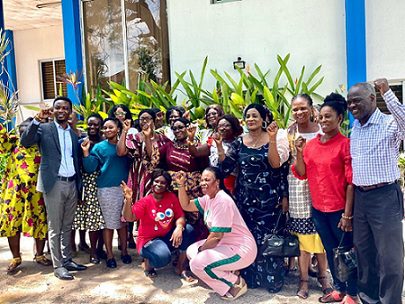Over the years, women have increasingly shown interest in the local government system that is intended to bring government to the doorstep of the citizenry.
Unfortunately, they have failed to meet the UN-recommended minimum threshold of 30% representation in the assemblies, resulting in major gender-based exclusion.
For instance, the 2006 Elections recorded the highest number of 478 women ever elected into Assemblies out of 1,772 women who contested.
With 909 women candidates against 17,601 males and only 226 winners out of more than 6270 electoral seats countrywide, the 2019 District Assembly Elections represent the second-lowest disappointing results for women and a dent in the country’s desire for genuine democracy.
This was made known at a press conference held in Accra under the theme: “Increasing Women’s Participation and Representation in the 2023 District Level Elections.
It was organized by ABANTU for Development with support from African Women Development Fund (AWDF).
Speaking at the conference, the Senior Programmes Officer, ABUNTU for Development Mary Akromah noted that women’s representation in District Assemblies stands at less than 5%.
As the country inches closer to Local Level Elections 2023, we call on the electorate to remember that increasing the representation of about 52 % of Ghana’s population, who happen to be women, will strengthen the country’s democracy,” she stated.
Stressing that women’s full and equal participation in the political and electoral process can be considered to be one of the litmus tests for women’s empowerment and gender equality.
“Women participating in elections whether partisan or non-partisan, without unfair gender-based barriers is a core component of delivering on the basic elements of democracy.
Inclusion of women in District Assemblies, is crucial for gender sensitivity, facilitating the equitable allocation of public resources, ensuring public accountability, and strengthening democratic culture for sustainable socio-economic development.
According to her, the underrepresentation of marginalized groups, particularly women, hinders not only the diversity of the legislative process but also consensus building around many of the critical challenges facing the country.
She, therefore, calls on the electorate to mobilise for and vote for women contesting the upcoming 2023 District Level Elections.
However, she also underscored the need for an immediate political will to demonstrate a firm commitment to gender equality issues especially as espoused within Ghana’s 1992 Constitution and equality laws.
Adding that, there is the need to promulgate the Affirmative Action Bill into Law as agreed by Ghana in CEDAW agreement and in the 1989 Government White Paper that will facilitate the 40% representation of women.
Edmund Nii Adjetey Adjei, Public Relations Manager of the National Association of Local Authorities of Ghana (NALAG), said in order to accelerate development in the country, there is a crucial need to involve women in decision-making.
He also entreated the media to use their platforms to promote women as ABUNTU for Development and its partners are working assiduously to increase women’s participation and representation in the 2023 District Level Elections.
“Currently, out of the 261 Metropolitan, Municipal, and District Chief Executives (MMDCEs), only 39 were women which represented 15 percent while 10 women were Presiding Members representing about 3.9 percent,” he disclosed.
The Chairman of the Food Security Policy Advocacy Network (FoodSPAN), Kingsley Offei-Nkansah, also seized the opportunity to encourage women entering into politics not to throw in the towel but rather to focus and push hard.
He also advised them to leverage technology when campaigning in order to reach out to the electorates.
Source: Isaac Kofi Dzokpo/newsghana.com.gh









![Fuse ODG violently handcuffed, dragged out of his car by UK Police over alleged ‘Wee’ smell [Video]](https://ghananewss.com/storage/2023/05/Fuse-ODG-hand-100x75.jpeg)






